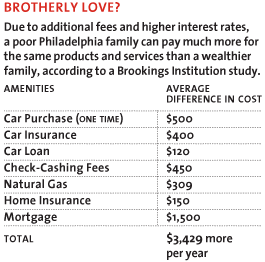As reported in the New York Times article “Study Documents ‘Ghetto Tax’ Being Paid by the Urban Poor,” Brookings Institution Senior Research Associate has Matt Fellowes has documented how the poor are charged more than the rest of us for basic services.
As the executive summary notes:
In general, lower income families tend to pay more for the exact same consumer product than families with higher incomes. For instance, 4.2 million lower income homeowners that earn less than $30,000 a year pay higher than average prices for their mortgages. About 4.5 million lower income households pay higher than average prices for auto loans. At least 1.6 million lower income adults pay excessive fees for furniture, appliances, and electronics. And, countless more pay high prices for other necessities, such as basic financial services, groceries, and insurance. Together, these extra costs add up to hundreds, sometimes thousands, of dollars unnecessarily spent by lower income families every year.
In the current issue of Mother Jones, I cited Fellowe’s previous research on the barriers facing Philapelphia’s poor (see chart) along with a whole bunch more depressing stats (all fully sourced) about how the poor are overcharged.

In Chicago’s poorest areas, the ratio of check-cashing outlets to banks is 10-to-1. Check-cashing fees for a worker who brings home $18,000 a year add up to about $450 —that’s 2.5% spent just to access income.
underserved:
In 1997, 3 out of 4 doctors provided some free or reduced-cost care. Now, 2 out of 3 do.
And just generally screwed over:
In 2004, 7 million working poor families spent $900 million on tax prep and check-cashing fees to get their refunds sooner. Average amount of time by which they sped up their refunds: 2 weeks.
Recently, I did a radio interview on this topic, in which the host asked me why nobody but John Edwards seemed to be concerned with the plight of the poor. I didn’t have a good answer, certainly the rest of the Democratic Party seems to be nowhere on this issue. Perhaps the best explanation is that Americans still believe that poverty is a sign of personal failing.
But the sad fact of it is that with 1 in 4 U.S. jobs paying less than a poverty-level income, more and more Americans will find themselves to be poor at some point in their lives. During the 1980s, 13% of Americans age 40 to 50 spent at least one year below the poverty line; by the 1990s, 36% did. And since 2000, the number of Americans living below the poverty line at any one time has steadily risen. Now 13% of all Americans—37 million—are officially poor.
And the poor are getting poorer. Among households worth less than $13,500, their average net worth in 2001 was $0. By 2004, it was down to –$1,400. That’s negative $1,400.
Local governments need to do their part. The Times notes that
“at a meeting connected with the [Brookings] report’s release, officials from three states—New York, Pennsylvania and Washington— said they were already doing just that through a variety of programs to draw banks to poor neighborhoods, help finance the construction of supermarkets and encourage innovative insurance schemes.”
That’s great. But in the meantime, President Bush’s tax cuts (recently extended until 2010) save those earning between $20,000 and $30,000 an average of $10 a year, while those earning $1 million are saved $42,700.
Oh, and in 2002, Sen. Charles Grassley (R-Iowa) compared those who point out statistics such as the one above to Adolf Hitler.












